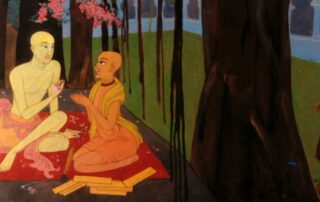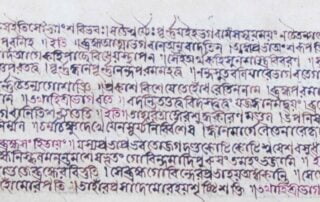Hari-nāma Cintāmaṇi – Chapter 12
Śrī Hari-nāma Cintāmaṇi was written in 1900 by Śrīla Bhaktivinoda Ṭhākura. This work of fifteen chapters composed in Bengali verse form, explains in detail the process of chanting the Holy Name, and especially deals with the ten offences as delineated in the Padma Purāṇa. The narrative is a dialogue between Śri Caitanya Mahāprabhu and Śrīla Hari Dāsa Ṭhākura. In the introduction, Bhaktivinoda Ṭhākura states that Hari-nāma Cintāmaṇi is based upon rare texts that he discovered during his research.
Hari-nāma Cintāmaṇi – Chapter 11
Śrī Hari-nāma Cintāmaṇi was written in 1900 by Śrīla Bhaktivinoda Ṭhākura. This work of fifteen chapters composed in Bengali verse form, explains in detail the process of chanting the Holy Name, and especially deals with the ten offences as delineated in the Padma Purāṇa. The narrative is a dialogue between Śri Caitanya Mahāprabhu and Śrīla Hari Dāsa Ṭhākura. In the introduction, Bhaktivinoda Ṭhākura states that Hari-nāma Cintāmaṇi is based upon rare texts that he discovered during his research.
Hari-nāma Cintāmaṇi – Chapter 10
Śrī Hari-nāma Cintāmaṇi was written in 1900 by Śrīla Bhaktivinoda Ṭhākura. This work of fifteen chapters composed in Bengali verse form, explains in detail the process of chanting the Holy Name, and especially deals with the ten offences as delineated in the Padma Purāṇa. The narrative is a dialogue between Śri Caitanya Mahāprabhu and Śrīla Hari Dāsa Ṭhākura. In the introduction, Bhaktivinoda Ṭhākura states that Hari-nāma Cintāmaṇi is based upon rare texts that he discovered during his research.
Hari-nāma Cintāmaṇi – Chapter 9
Śrī Hari-nāma Cintāmaṇi was written in 1900 by Śrīla Bhaktivinoda Ṭhākura. This work of fifteen chapters composed in Bengali verse form, explains in detail the process of chanting the Holy Name, and especially deals with the ten offences as delineated in the Padma Purāṇa. The narrative is a dialogue between Śri Caitanya Mahāprabhu and Śrīla Hari Dāsa Ṭhākura. In the introduction, Bhaktivinoda Ṭhākura states that Hari-nāma Cintāmaṇi is based upon rare texts that he discovered during his research.
Hari-nāma Cintāmaṇi – Chapter 8
Śrī Hari-nāma Cintāmaṇi was written in 1900 by Śrīla Bhaktivinoda Ṭhākura. This work of fifteen chapters composed in Bengali verse form, explains in detail the process of chanting the Holy Name, and especially deals with the ten offences as delineated in the Padma Purāṇa. The narrative is a dialogue between Śri Caitanya Mahāprabhu and Śrīla Hari Dāsa Ṭhākura. In the introduction, Bhaktivinoda Ṭhākura states that Hari-nāma Cintāmaṇi is based upon rare texts that he discovered during his research.
Hari-nāma Cintāmaṇi – Chapter 7
Śrī Hari-nāma Cintāmaṇi was written in 1900 by Śrīla Bhaktivinoda Ṭhākura. This work of fifteen chapters composed in Bengali verse form, explains in detail the process of chanting the Holy Name, and especially deals with the ten offences as delineated in the Padma Purāṇa. The narrative is a dialogue between Śri Caitanya Mahāprabhu and Śrīla Hari Dāsa Ṭhākura. In the introduction, Bhaktivinoda Ṭhākura states that Hari-nāma Cintāmaṇi is based upon rare texts that he discovered during his research.
Hari-nāma Cintāmaṇi – Chapter 6
Śrī Hari-nāma Cintāmaṇi was written in 1900 by Śrīla Bhaktivinoda Ṭhākura. This work of fifteen chapters composed in Bengali verse form, explains in detail the process of chanting the Holy Name, and especially deals with the ten offences as delineated in the Padma Purāṇa. The narrative is a dialogue between Śri Caitanya Mahāprabhu and Śrīla Hari Dāsa Ṭhākura. In the introduction, Bhaktivinoda Ṭhākura states that Hari-nāma Cintāmaṇi is based upon rare texts that he discovered during his research.
Hari-nāma Cintāmaṇi – Chapter 5
Śrī Hari-nāma Cintāmaṇi was written in 1900 by Śrīla Bhaktivinoda Ṭhākura. This work of fifteen chapters composed in Bengali verse form, explains in detail the process of chanting the Holy Name, and especially deals with the ten offences as delineated in the Padma Purāṇa. The narrative is a dialogue between Śri Caitanya Mahāprabhu and Śrīla Hari Dāsa Ṭhākura. In the introduction, Bhaktivinoda Ṭhākura states that Hari-nāma Cintāmaṇi is based upon rare texts that he discovered during his research.
Vaiṣṇava Siddhānta Mālā 6
‘Vaiṣṇava Siddhānta Māla,’ written by Bhaktivinda Ṭhākura in 1888, was a work meant to introduce the general public to the nine basic principles of Gauḍīya Vaiṣṇava philosophy. The first part of the book is in the form of questions and answers. Subsequent chapters deal with the topic of the Holy Name.
Vaiṣṇava Siddhānta Mālā 5
‘Vaiṣṇava Siddhānta Māla,’ written by Bhaktivinda Ṭhākura in 1888, was a work meant to introduce the general public to the nine basic principles of Gauḍīya Vaiṣṇava philosophy. The first part of the book is in the form of questions and answers. Subsequent chapters deal with the topic of the Holy Name.










